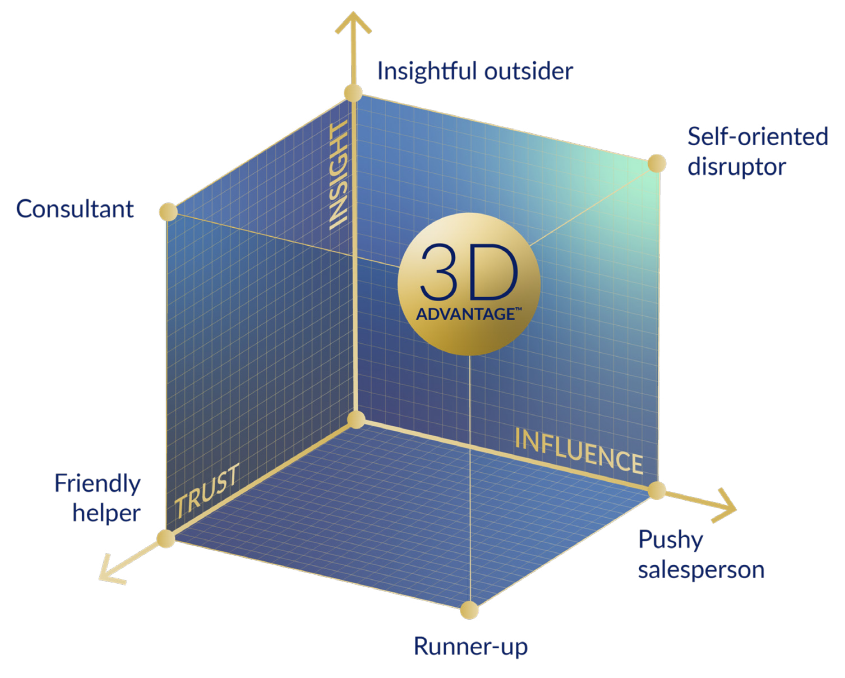Building Competitive Advantage in the Era of “Magic Bullet” Selling

To win at selling, how good do you need to be? The answer, of course, is, “Better than the competition.” That’s true whether the competition is another company, another use of the customer’s budget, or simply the status quo.
Beating the competition is extremely difficult, however, and it’s an arms race that keeps getting harder. It requires you to do many things slightly better rather than just focusing on one thing. Yet, many sales training companies – in their search for the “magic bullet” – offer one-dimensional approaches that seem compelling but fail to deliver.
Drawing on Imparta’s rich research base and over 20 years of experience helping global clients supercharge their go-to-market strategies, the 3D Advantage™ sets out a definitive approach to achieving remarkable sales performance.
It focuses on three dimensions of selling – insight, influence, and trust – that can allow even average salespeople to create, differentiate, protect, capture, and expand value around the whole customer buying cycle.
Insight is how salespeople create value through disruptive, specific insights into a customer’s needs, solutions, and decision process.
Influence allows salespeople to achieve desired outcomes within the account, through the ethical use of behavioral science and decision strategy.
Trust grows from a combination of factors, including customer orientation. It unlocks access to the conversations where salespeople can deliver insight and influence.
Insight, influence, and trust are the critical dimensions of a successful sale, but each one presents challenges.
INSIGHT
Insight can be an extremely effective tool to disrupt the status quo and uncover new opportunities. But there are three problems in the way it is often used.
Insight is powerful – but, like beauty, it’s in the eye of the beholder. One person’s insight is another person’s statement of the obvious. To be effective, insights need to be matched organically to the specific objectives and concerns of the organization and the individual.
Insight on its own is not enough to influence the outcome of a conversation. Salespeople must also guide the customer around their buying cycle. For example, insight can reveal a new need, but the salesperson also needs to influence the level of urgency, help build consensus, influence stakeholders, win the pitch, and alleviate any perceived risks.
To deliver insight, you need to be trusted. The deepest insight will achieve nothing if customers don’t trust it or listen to it (only 29 percent of customers actually want to talk to a salesperson, according to HubSpot). Customer-centricity is at the very heart of being trusted, but insight-based selling often comes across as self-oriented.
Insight on its own doesn’t build trust or influence customers toward a desired outcome. It makes you what we call a “Disruptive Outsider.”
INFLUENCE
Selling is very much about persuasion and influencing the outcome of a decision, but influence is also not enough on its own to win deals against a skilled competitor.
Influencing strategies are vulnerable to game-changing insights. It’s essential to influence decisions – for example, by understanding the power and alignment of decision makers and exploring their decision criteria in advance of a pitch. But, even if you know how to influence, you can still lose to a competitor who makes the customer think about their decision in an entirely new way. On its own, insight is not enough to guarantee success, and the same is true of influencing skills.
Influencing activities can also destroy trust. One of the other challenges with influencing customers is that influencing is fundamentally supplier-centric. You’re trying to get the customer to do what you want them to do; and, if you don’t do that with subtlety, it can easily destroy trust.
Influencing skills – based on behavioral science and decision strategy – are extremely powerful in guiding customers toward the right decision. However, influence without trust is ineffective, and influence without insight doesn’t create enough value to change the status quo and win deals. People who rely only on influence risk being seen as a “Pushy Salesperson.”

TRUST
Relationships and the ability to create trust are key to new business development and growing existing accounts. But here, too, the one-dimensional approach is not enough.
Trust without insight doesn’t stimulate demand. Trust is an enabler of growth, not a driver of it. Clients may turn to a trusted advisor when they themselves have identified a need; but, in order to stimulate demand, the salesperson needs to be proactive in bringing insight to the discussion.
Trust is insufficient to influence outcomes. Just as trust on its own isn’t enough to stimulate demand, it’s also not enough to get a customer to act. The customer buying cycle is complex and iterative, so salespeople need a range of influencing skills to encourage and guide customers around the cycle.
Someone who relies only on trust to sell is what we at Imparta describe as a “Friendly Helper.” They are vulnerable to more insightful or influential competitors, and are not proactive enough to drive growth in the business. They’re also the most common type of salesperson in most companies.
THE 3D SALESPERSON
Insight, influence, and trust are not (when taken individually) sufficient to win. The above diagram shows what happens when you have just one or two of those dimensions. Yet, taken together, they are the three dimensions that most accurately define what remarkable selling is all about.
The 3D Salesperson is able to stimulate demand and unseat competitors through the agile use of insight. They are able to navigate the buying cycle and win deals through a range of influencing strategies and skills, and they maintain access to key stakeholders by building and maintaining trust throughout.
Richard Barkey is founder and CEO of Imparta, and President of Imparta, Inc.
Get our Enewsletter
Get the latest sales leadership insight, strategies, and best practices delivered weekly to your inbox.
Sign up NOW →